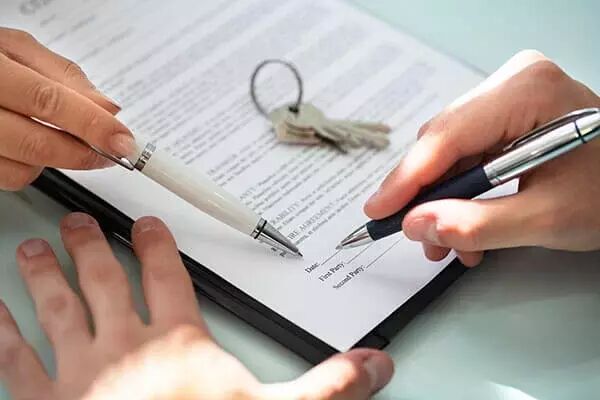The Main Principles Of Conveyancer
The Main Principles Of Conveyancer
Blog Article
Conveyancer - Truths
Table of ContentsHow Conveyancer can Save You Time, Stress, and Money.Things about Conveyancer3 Easy Facts About Conveyancer ShownThings about ConveyancerConveyancer Fundamentals ExplainedSome Known Details About Conveyancer
In terms of acquisition, they carry out due diligence which entails the verification of all important lawful files. The due persistance recognizes any existing constraints; such as caveats and easements concerning the title certificate and any type of other pertinent documentation. Any type of kind of encumbrance can put limitations on exactly how the residential property can be delighted in by the proprietor and therefore, should be validated before wrapping up the contract.This may put the customer in a placement of concession which can otherwise be avoided under the specialist guidance of a conveyancer. Purchasing or marketing a home can entail a couple much more monetary commitments various other than the cost of buying the building. Supposedly, a person offering their residential property has actually paid the council 6 months in development.

A Biased View of Conveyancer
The conveyancer should see to it that all lawful documentation has been arranged and prepared for the reliable transfer of building ownership. The conveyancer works as a guardian in behalf of the customer to ensure that absolutely nothing stands in the method of them taking possession of the possession they have spent for.
During this time around, they ensure all the documentation, cheques and documents essential for the deal are turned over. Once the negotiation is complete, the conveyancing lawyer will certainly get to out to the building buyer or their real estate agent for the conclusion of the sale. The challenges and responsibilities of a are a lot more complex than they can be taken into viewpoint.
Read more of Allen West's write-up at.
Division. Conveyancing is the lawful procedure that takes location when authorized ownership is obtained of immovable home.
Conveyancer Things To Know Before You Buy

The prices are imposed according to the Regulation Society's tariff standards. A Conveyancer must: In any way times secure the rate of interest of his/her clients and based on the authorized Sale Agreement; Maintain all events educated of the development on their transaction and educate both celebrations of the conveyancing procedure and processes; Recommend the events on the problems of the Sale Agreement, specifically pertaining to suspensive problems and commitments; Suggest the seller on the termination of his bond, any type of fines, notification periods and other management charges which might affect the negotiation figure; Get the seller's written directions before he/she, as the Conveyancer, problems any assurances in respect of the deal; Do everything in his/her power to sign up the deal on or as close as possible to the day consented to in the Sale Contract; Advise both celebrations on their obligations in regards to their Sale Agreement, so regarding ensure that the transfer is not postponed needlessly; Meet both parties to authorize the applicable paperwork connecting to the deal Prepare the acts for lodgement with the utmost care, so regarding make certain that they minimise the danger of a denial of the documentation by the relevant Deeds Registry; Inform both celebrations of the transfer on the day of enrollment; Account to both parties for financial resources associating with the transaction within 2/ 3 days complying with successful enrollment of the purchase in the applicable Deeds Computer system registry.
It becomes part of your conveyancer's job to collaborate a negotiation time with the opposite side's lawful rep, throughout which time the residential property link is officially transacted and all documents and cheques are handed over - Conveyancer. Upon settlement, your conveyancer will make contact with you and/or your genuine estate agent to verify settlement and enable secrets to be handed over
No person wishes to experience a difficult or frustrating scenario when you should simply be excited for your next action. This is where conveyancing can aid the procedure to relocate along properly. The role of a property conveyancer is to handle this lawful procedure of moving the ownership and title of a home from the vendor to the purchaser.
However attorneys frequently have a range of areas they have competence in, with conveyancing probably being an area they don't practise in usually. The advantage of utilizing a residential property conveyancer is that residential property deals are what they accomplish regularly. They understand the procedure in and out and are really accustomed to it, guaranteeing all relevant documents is supplied and the process is exact and timely.
The 25-Second Trick For Conveyancer
You can additionally satisfy this link with your conveyancer prior to house hunting or offering your property if you need support in this procedure. If you have selected to offer or acquire a residential property without an actual estate agent, the conveyancer will certainly have the ability to take care of the Contract of Sale to ensure it accurately shows the sale or acquisition.
Picking a choice for no other reason than it's less expensive can create extra issues in the long term with an imprecise or inefficient service. Search for a repaired rate solution so you recognize exactly what the procedure will certainly cost you and whether it fits right into your scheduled spending plan. Referrals from close friends or family members, or reviewing on the internet testimonials can additionally serve in finding a knowledgeable and efficient conveyancer.
Conveyancing solicitors and licensed conveyancers both oversee the conveyancing process. Nonetheless, their specialist backgrounds differ. A conveyancing solicitor is an individual that is a completely qualified lawyer (as a member of the Law Culture) and that specialises in conveyancing. A residential or commercial property solicitor will commonly often tend to have experience in various other legal locations as well.

Conveyancer Fundamentals Explained
They liaise with various parties, including the estate agent, seller's conveyancer, and regional authorities. The conveyancing procedure starts when a deal on a building is approved.
The buyer's lawyer will make sure the customer is informed regarding the documents and legal commitments. This stage entails clarifying the conveyancing expenses and detailing the building information form. Being informed can protect against unexpected issues as the process unfolds. Property searches offer an objective in the conveyancing procedure. The customer's lawyer arranges these checks to expose potential concerns with the property.
Local authorities could give insight right into close-by future growths that may influence the residential or commercial property's worth. A residential property's title deeds stand for a historic record of its possession.
When a view publisher site deal is accepted, the vendor's lawyer prepares a draft contract. This agreement pack consists of necessary files like the building information type, the leasehold details form, and the fittings and components create. The buyer's conveyancer analyzes these to make certain all the paperwork is constant with assumptions. At this phase, residential property law considerations develop, from common access rights to what fixtures feature the home.
Excitement About Conveyancer
On this day, the buyer pays the continuing to be equilibrium, and the seller transfers the residential or commercial property tricks - Conveyancer. There's commonly a space in between exchange and completion for purchasers to finalise information or make arrangements.
Report this page